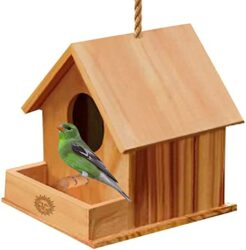What Are The Ecological Benefits Of Forests? There is nothing like a tree. The beauty, the shadows, the birds.
Not only that—without trees, where would we put tree houses or tire swings?
Truly, a tree is a special thing in this world of ours.
Have you ever seen an old tree and stopped, just to put your hands on the bark and listen?
That’s right—listen. If you touch an old tree and allow yourself to hear, something inside.
You can almost pick up sounds from the past.
Children playing, animals running, even storms breaking if you allow it to happen.
Now, remove your fingers from the ancient growth.
And you will find you are changed forever.
We’re not just talking about the ants under your fingernails, either.
We mean the way you can travel through time.
Seeing and hearing things you never thought existed.
And all you have to do is touch a tree. One tree.
Now, what if you were some place that had hundreds, or even thousands, of these plants?
Growing since before explorers like Magellan set out.
Trees that were whispering to one another while Jesus was making news in another part of the world.
Of course, when a lot of trees grow near each other for a long time.
Usually is called a forest.
And if one tree has so much power, imagine how much force there is in a forest.
Yes, trees are fascinating.
They accomplish anything that can be measured?
Trees grow and grow until they are forests.
But do they benefit our world in any way?
Ecologically, for example?
Are there ecological benefits to allowing forests to grow? If so, What are they?
WHAT ARE THE ECOLOGICAL BENEFITS OF FORESTS.
Stabilizing soil.
When trees reach down into the soil, they act as an anchor.
Soil that would normally wash away is kept in place.
Often, when plants, specifically, plants with long, deep roots.
Are not grown in soil for a long time, the soil becomes less dense and doesn’t hold together well.
This kind of soil is difficult to build in, plant in even walk in.
Trees and their roots give soil a reason not to simply dry up and blow away.
Absorbing CO2 carbon dioxide is one of the biggest problems we have when it comes to greenhouse gasses.
These greenhouse gasses are causing dire problems in our world.
We have been experiencing out of control wild fires.
The polar ice caps are melting, among other things.
Forests have leaves and plants that survive through photosynthesis.
This process takes carbon dioxide, water, sugar and sunlight, use them to grow.
We especially need this right now, while we are working to clean up the air of our environment.
It is like having beautiful, free machines helping us.
Less air conditioners being used.
Companies have found that if they don’t clear cut, and leave plenty of trees up.
New buildings reduces how much air conditioning is needed during hot weather.
Air conditioners are notorious for contributing to the greenhouse gas effect.
So the new buildings get a better view.
Save the planet! Kind of makes a person wonder why in the world builders ever wanted to clear cut.
Better controlled water patterns forests absorb water and release it later.
Roots control how water flows. Leaves can even be a type of clarification process.
In some countries, like Canada, it is quite common to drink water that has been forest cleaned.
Improved blood pressure, better immune system.
When we think of something being ecologically beneficial, too often, our thoughts stop at the circle of the earth.
Well, we are part of that circle. It is too easy to forget.
When people spend time in a forest. It has been proven that immune systems have been strengthened.
Blood pressure has gone down. Why take medications with countless side effects.
Everything from muscle weakness to cancer. When we can take a walk through the woods?
Animals Have a Home. Naturally, we usually think of birds when we think of a forest.
One of the wonderful things about going into the woods is listening to the birds.
But there are countless animals that need the forests in order to live.
And as we wander through a forest and see or hear animals around us, birds are only the beginning of the story.
There are a lot more to come. Because nature has made it so that forests are home to animals and so much more.
Insects and Bugs have a home.
Most of us could happily live without a lot of the bugs we have in our lives.
But those bugs are part of a web of survival.
When one small creature exists, another creature can feed off of it.
Another creature can feed off of the creature that fed off of the other creature.
They are like dominoes. And if one or two of those things are removed.
It makes a large impact on the rest of the world.
They are important. As a food source, and in other ways that we probably haven’t discovered yet.
When one kind of bacteria is removed from the scene, it is like removing a leg from a footstool.
It seems we can do fine without one, until it is gone.
And forests are places where bacteria can grow and do the balancing act that nature intended.
When the leaves, flowers, even wood of the different plants in a forest die, they fall to the ground.
Once on the ground, these plant parts are able to provide homes for insects and animals.
Then the plant parts gradually decompose, go into the soil, and add nutrients to the soil.
As the plants break down, they feed other plants that are coming up.
It is nature’s version of “Miracle Grow”, only without the chemicals, or high price.
The plants grow, age, die, decompose, then feed the next generation of plants.



